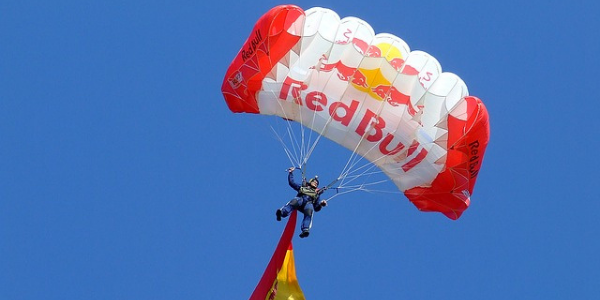Over $10 billion in U.S. sponsorship value will need to be restored due to the sports and entertainment shutdown caused by COVID-19.
There’s no doubt that these industries are among those that suffered the most financially throughout the pandemic, but we tend to forget that the companies who rely on them as a revenue channel have been enormously impacted as well. Over 120,000 sponsorship agreements were placed in limbo, and more than 5,000 brands are faced with decisions on how to make up for the lost value.
However, things are beginning to change for sports and entertainment — ultimately allowing for the success of the sponsorship industry to return as well.
What is Sponsorship Marketing?
Let’s back up and talk about what exactly sponsorship marketing means.
Sponsorships involve a two-party business relationship where one party (the sponsor) provides support in the form of funding, resources or services to the other party (the beneficiary), who will provide access to the sponsor for rights and associations used for commercial advantage.
There are two main types of sponsorship: financial and in-kind.
A financial sponsor (i.e. cash sponsors) is the most popular form of sponsorship. Simply put, a brand or business gives money to an entity in return for promotional and other benefits outlined in an agreement. Some examples of financial sponsorship are series sponsor, general sponsor, team sponsor and official sponsor.
An in-kind sponsorship is when the sponsor agrees to provide goods or services (value in-kind) instead of cash as part of a sponsorship agreement. Examples of in-kind sponsors include venue sponsors, prize sponsors, food sponsors, digital sponsors and technical sponsors.
Even though sponsorship is a form of marketing, it is different from advertising because sponsorships don’t directly promote your company or products. Instead, your company pays to support your customer’s interests. A sponsored party can include anything from an event, organization or even an individual.
Sports Sponsorships
The most common type and largest revenue market in sponsorships is sports marketing. In 2018, the revenue of the North American sports sponsorship market was estimated at $17.17 billion USD. This number is expected to increase to over $20 billion USD by next year and $20.65 billion USD in 2023.
Global sporting events such as the Olympics, FIFA World Cup and the Super Bowl comprise a substantial part of sponsorship revenue. During the 2016 Summer Olympic Games in Rio de Janeiro, sponsorship revenue amounted to $848 million USD. The 2019-2020 NFL season exceeded $1.47 billion with nearly 1,500 existing partnerships and more than 350 new deals signed.
Unfortunately, COVID-19 had an incredible impact on the sports industry in 2020. Several events and even seasons were canceled or postponed due to the virus.
Canceled
- NCAA Men’s Basketball Tournament
- NCAA Men’s College World Series
- NCAA Women’s College World Series
- NCAA College Football Spring Practice
- Several NCAA College Football games
- Wimbledon Championships
- Al Ivy League Fall Sports
- 2020 NFL Draft
- Boston Marathon
Postponed
- 2020 Tokyo Olympics
- NBA Season (Suspended, then returned)
- WNBA Season (Suspended, then returned)
- 2020 NBA Draft
- MLB Season
- 2020 Master’s Tournament
- NASCAR Cup Series (Suspended, then returned)
- UFC Season
- NHL Season (Suspended, then returned)
- Kentucky Derby
- MLS Season (Suspended, then returned)
- World Series of Poker
- Tour de France
However, the sports industry is off to a better start in 2021. Fans are allowed into stadiums with new safety precautions, and advertisers can expect sponsorships to return to this market.
Benefits of Sponsorship Marketing
Regardless of the type, sponsorships allow you to reach your target market based on their interests and affinities. With strategic planning, sponsorships can help your business meet multiple marketing goals all at once.
Here are some key benefits of sponsorship marketing:
- Shaping consumer attitudes through goodwill: Sponsoring events that your customers care about allows them to recognize that your brand aligns with their cause or interest. Therefore, this creates positive feelings about your brand and a positive attitude toward your company. The presence of goodwill from the sponsor in supporting the beneficiary will leave a lasting impact on consumers.
- Building brand awareness and equity: Strategically selecting sponsorship opportunities will connect you with an audience that will appreciate your product or service. Sponsorships provide a unique way to introduce your brand to potential customers — ultimately increasing brand equity. Brand equity is strengthened when consumers are familiar with it and hold favorable associations with it. Moreover, people who attend your sponsored event and have a positive interaction with it will continue to talk about your service or product, increasing its reach.
- Generating sales, profitability and new leads: Increasing your profitability is typically the end goal, but sponsorship marketing can help achieve that in unique ways. Driving sales goes hand-in-hand with brand awareness. Showcase your product or service, and intrigue them with a strong call-to-action.
Questions During Research
As you begin to build your next sponsorship plan, educate yourself on ideal events or partners that your target audience cares about. Ask yourself these questions when researching possible partners or events:
- “Have they worked with sponsors before?”
- “If not, are they open to the idea in the future?"
- “What type of financial support do they expect from sponsors?”
- “How much exposure can you reasonably expect at different levels of sponsorship?”
Depending on the value of various sponsorship opportunities, you may realize that utilizing sponsors is a better use of your marketing budget than other forms of marketing.
Key Takeaways
- Understand the differences between financial and in-kind sponsorships; then decide which one is the best fit for your brand.
- Explore the returning sports industry; uncover how and where you can leverage sponsorship opportunities to connect with your ideal audience.
- While the ultimate goal is to increase profitability, positive consumer attitudes and strong brand equity are essential for long-term success.
How MBI Can Help
If you need a comprehensive sports or entertainment marketing plan, our team has the experience and resources to deliver just that.
For decades, we have placed and developed strategic ad packages at major sporting and entertainment events. Our media strategists work with some of the largest sports leagues and event promoters in the world, including the NFL, MLB, NBA, NCAA, NASCAR, Live Nation, Olympics and numerous sports marketing agencies. We pride ourselves on maintaining close, strong and transparent relationships with each organization.
Let us show you the world of sports and entertainment and how passionate consumers are about their favorite teams and events. Rely on MBI to successfully meet all of your sponsorship needs by connecting with a media strategist today!

